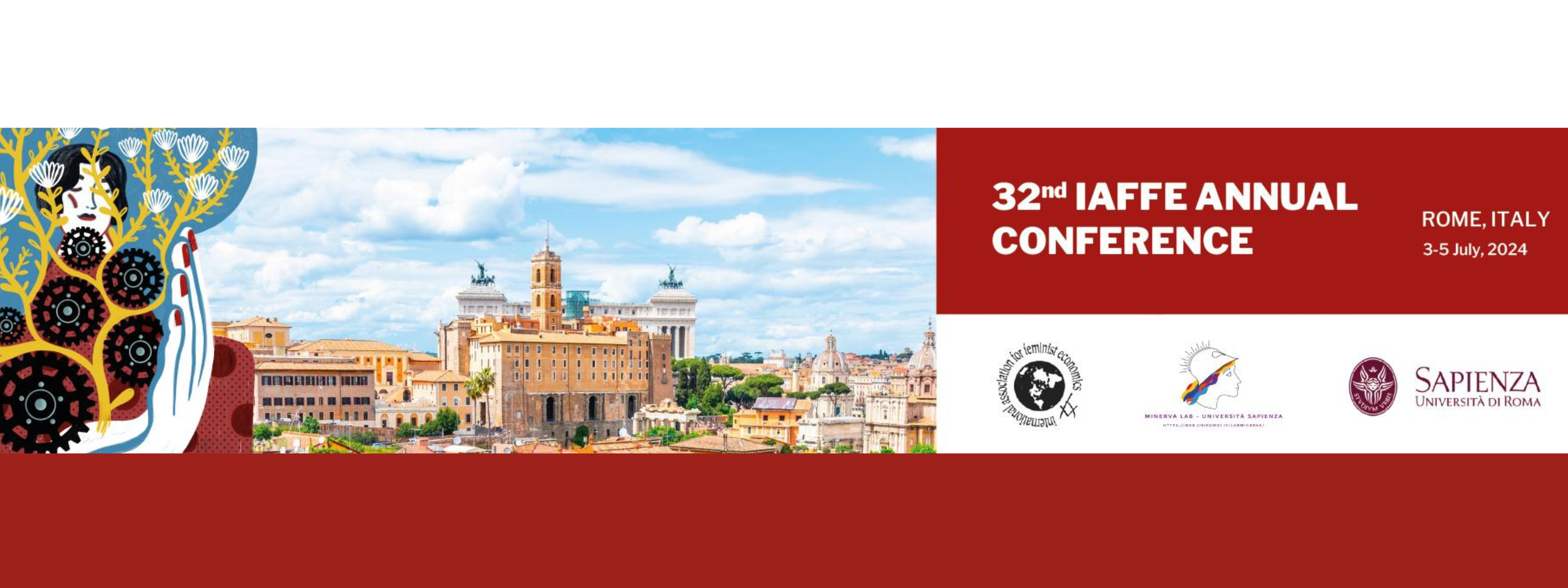
IT for Change participated in the 32nd International Association for Feminist Economics (IAFFE) Annual Conference in Rome from 3-5 July 2024. The theme of the conference was - Caught Between the Digital Revolution and a Crisis of Democracy: Feminist Economics Responses and Imaginations for the Future.
The conference aspired to provoke critical reflection on feminist economics responses to two of the defining features of the current economic and political landscape: the technological breakthroughs of a digital economy on the one hand, and a crisis of democracy, political polarization, and backlash on the other.
At the conference, IT for Change members took part in the following events and discussions:
1. Opening Plenary
Our Executive Director, Anita Gurumurthy, was invited to speak at the opening plenary, where she spoke about digitalization as a phenomenon in the international political economy of development amidst the loss of ground for feminism.
Access her complete speech here.
2. Fair, Feminist, Futuristic: Platform Models for a Digital New Deal
IT for Change hosted a roundtable, titled ‘Fair, Feminist, Futuristic – Platform models for a Digital New Deal,’ aimed at exploring the goals, journeys, trials, and tribulations of alternative platform models across different sectors – agriculture, services, community care, etc. The primary aim of the roundtable was to explore theory and practice in developing alternative and equitable platform models, particularly so in the context of today's evolving digital landscape.
IT for Change’s Ranjitha Kumar chaired the roundtable. The panel consisted of research-practitioners working towards building collectivist platform models, including:
i. Viraj Desai (IT for Change)
ii. Stacco Troncoso (DisCO Coop)
iii. Prerak Shah (Vrutti),
iv. Emma Back (Equal Care Coop).
v. Alessandra Mezzadri (SOAS, UK)
vi. Prapti Barooah (International Food Policy Research Institute)
vii. Ambika Tandon (Cambridge University)
View the concept note and event report of the roundtable here.
3. A Global Compact for a Feminist Digital Economy
Our Research Associate, Merrin Muhammed Ashraf took part in a discussion on ‘A Global Compact for a Feminist Digital Economy.’ Here, Merrin presented the high points of the ‘Charter of Feminist Demands from the Global South: A Global Digital Compact for Gender Equality,’ which was co-constructed by IT for Change and Friedrich-Ebert-Stiftung. During her presentation, Merrin particularly focused on the Charter's demand for a new global social contract for a socially just digital transition.
Other speakers who were a part of the panel included:
i. Eugenia Amporfu, Associate Professor in the Department of Economics, KNUST, who spoke about the idea of meaningful inclusion that bridges the gender digital divide as a development divide.
ii. Florentia Partenio, DAWN's Executive Committee member, who spoke about the Feminist Digital Manifesto that was constructed by a working group convened by DAWN and IT for Change.
iii. Abdul Muheet Chowdhary, Senior Program Officer with the South Centre Tax Initiative, who spoke about the need for reforms in the taxation regime and other dimensions of international economic law to reign in the power of transnational digital corporations in order to build the new global digital economic order that is feminist and decolonial.
iv. Marina Durano, Adviser on Care Economy and Partnership Engagement at UNI Global Union, who spoke about the new imaginaries needed for a feminist social contract on the data commons.
The panel was moderated by Lydia Both, head of the FES regional project on political feminism and gender in Beirut.
4. Unpacking the Gig: Exploring the Extractive Nature of the Digital Economy through Social Reproduction and Southern Feminist Perspectives
IT for Change’s Ranjitha Kumar participated in this discussion, moderated by Florencia Partenio from DAWN.
Ranjitha spoke on the theme of social reproduction in the gig economy, providing qualitative insights from India. In her presentation, she highlighted the problems of the “flexible work narrative” vis-à-vis gig work and provided insights on alternative, women-led, worker-led digital platforms as a solution.
View her presentation here.
Know more about the conference here and view the program agenda of the event here.
